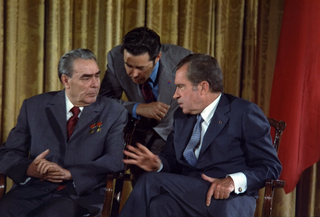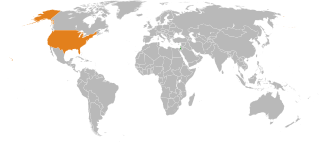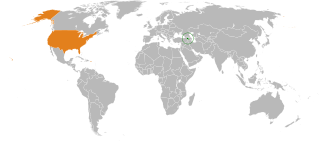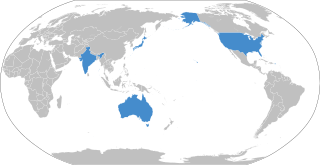Related Research Articles

Détente is the relaxation of strained relations, especially political ones, through verbal communication. The diplomacy term originates from around 1912, when France and Germany tried unsuccessfully to reduce tensions.

The Glassboro Summit Conference, usually just called the Glassboro Summit, was the 23–25 June 1967 meeting of the heads of government of the United States and the Soviet Union—President Lyndon B. Johnson and Premier Alexei Kosygin, respectively—for the purpose of discussing Soviet Union–United States relations in Glassboro, New Jersey. During the Arab–Israeli Six-Day War diplomatic contact and cooperation increased, leading some to hope for an improvement in the two countries' relations. Some even hoped for joint cooperation on the Vietnam War. Although Johnson and Kosygin failed to reach agreement on anything important, the generally amicable atmosphere of the summit was referred to as the "Spirit of Glassboro" and is seen to have improved Soviet–US relations.

Lloyd James Austin III is a retired United States Army four-star general who has served as the 28th and current United States secretary of defense since January 22, 2021.

Since the 1960s, the United States has been a strong supporter of Israel. It has played a key role in the promotion of good relations between Israel and its neighbouring Arab states—notably Jordan, Lebanon, Egypt—while holding off hostility from countries such as Syria and Iran. Relations with Israel are an important factor in the U.S. government's overall foreign policy in the Middle East, and the U.S. Congress has placed considerable importance on the maintenance of a supportive relationship.
Steven J. Rosen served for 23 years as one of the top officials of the American Israel Public Affairs Committee (AIPAC). He is often singled out in writings about AIPAC.

The Australia, New Zealand, United States Security Treaty is a 1951 non-binding collective security agreement initially formed as a trilateral agreement between Australia, New Zealand, and the United States; and from 1986 an agreement between New Zealand and Australia, and separately, Australia and the United States, to co-operate on military matters in the Pacific Ocean region, although today the treaty is taken to relate to conflicts worldwide. It provides that an armed attack on any of the three parties would be dangerous to the others, and that each should act to meet the common threat. It set up a committee of foreign ministers that can meet for consultation.

United States foreign policy in the Middle East has its roots in the early 19th-century Tripolitan War that occurred shortly after the 1776 establishment of the United States as an independent sovereign state, but became much more expansive in the aftermath of World War II. With the goal of preventing the Soviet Union from gaining influence in the region during the Cold War, American foreign policy saw the deliverance of extensive support in various forms to anti-communist and anti-Soviet regimes; among the top priorities for the U.S. with regards to this goal was its support for the State of Israel against its Soviet-backed neighbouring Arab countries during the peak of the Arab–Israeli conflict. The U.S. also came to replace the United Kingdom as the main security patron for Saudi Arabia as well as the other Arab states of the Persian Gulf in the 1960s and 1970s in order to ensure, among other goals, a stable flow of oil from the Persian Gulf. As of 2023, the U.S. has diplomatic relations with every country in the Middle East except for Iran, with whom relations were severed after the 1979 Islamic Revolution, and Syria, with whom relations were suspended in 2012 following the outbreak of the Syrian Civil War.

Military relations between Israel and the United States have been extremely close, reflecting shared security interests in the Middle East. Israel is designated as a major non-NATO ally by the U.S. government. A major purchaser and user of U.S. military equipment, Israel is also involved in the joint development of military technology and regularly engages in joint military exercises involving United States and other forces. The relationship has deepened gradually over time, though, as Alan Dowty puts it, it was "not a simple linear process of growing cooperation, but rather a series of tendentious bargaining situations with different strategic and political components in each."
The 'OMEGA' Memorandum of March 28, 1956, was a secret U.S. informal policy memorandum drafted by Secretary of State John Foster Dulles for President Dwight D. Eisenhower. The goal of the policy was to reduce the influence in the Middle East of Egypt's President Gamal Abdel Nasser because he seemed to be leaning in favor of the Soviet Union and he failed to provide the leadership that Dulles and Eisenhower had desired toward settling the Arab-Israeli conflict. Eisenhower approved the memorandum. Around the same time, the British government formulated a similar strategy. The United States and Britain intended to coordinate activities between them to implement the new strategies in successive stages.

In July 2001, President Abdelaziz Bouteflika became the first Algerian President to visit the White House since 1985. This visit, followed by a second meeting in November 2001, and President Bouteflika's participation at the June 2004 G8 Sea Island Summit, is indicative of the growing relationship between the United States and Algeria. Since the September 11 attacks in the United States, contacts in key areas of mutual concern, including law enforcement and counter-terrorism cooperation, have intensified. Algeria publicly condemned the terrorist attacks on the United States and has been strongly supportive of the Global War on Terrorism. The United States and Algeria consult closely on key international and regional issues. The pace and scope of senior-level visits has accelerated.

The dissolution of the Soviet Union in December 1991 brought an end to the Cold War and created an opportunity for establishing bilateral relations between the United States with Armenia and other post-Soviet states as they began a political and economic transformation. The United States recognized the independence of Armenia on 25 December 1991, and opened an embassy in Armenia's capital Yerevan in February 1992.

Egypt and the United States formally began relations in 1922 after Egypt gained nominal independence from the United Kingdom. Relations between both countries have largely been dictated by regional issues in the Middle East such as the Israeli–Palestinian conflict and Counterterrorism. But also domestic issues in Egypt regarding the country's human rights record and American support for the regimes of Hosni Mubarak and Abdel Fattah el-Sisi which the United States had come under controversy for in the aftermath of the 2011 Egyptian Revolution, and with many dissents of the current regime describing Sisi's rule as tyrannical.
The Strategic Cooperation Agreement was concluded on November 30, 1981 between the United States and Israel during the first Reagan administration and coincided with an official visit of Israeli Prime Minister Menachem Begin. The agreement was signed by Israeli Defense Minister Ariel Sharon and American Secretary of Defense Caspar Weinberger and pledged specific actions from both parties to increase strategic cooperation between them. The main objective was to deter Soviet threats and ‘Soviet controlled forces’ in the Middle East. Israel had aimed for some time at the creation of a more formal bond which would commit the United States to a closer military cooperation. The signing marked the beginning of close security cooperation and coordination between the American and Israeli governments. It was formally reconfirmed at the time of Reagan’s second peace initiative, on April 21, 1988.
The Soviet Union and Pakistan first established the diplomatic and bilateral relations on 1 May 1948.
U.S. President Barack Obama's East Asia Strategy (2009–2017), also known as the Pivot to Asia, represented a significant shift in the foreign policy of the United States since the 2010s. It shifted the country's focus away from the Middle Eastern and European sphere and allowed it to invest heavily and build relationships in East Asian and Southeast Asian countries, especially countries which are in close proximity to the People's Republic of China (PRC) either economically, geographically or politically to counter its rise as a rival superpower.

The Moscow Summit was a summit meeting between U.S. President Ronald Reagan and General Secretary of the Communist Party of the Soviet Union Mikhail Gorbachev. It was held on May 29, 1988 – June 3, 1988. Reagan and Gorbachev finalized the Intermediate-Range Nuclear Forces Treaty (INF) after the U.S. Senate's ratification of the treaty in May 1988. Reagan and Gorbachev continued to discuss bilateral issues like Central America, Southern Africa, the Middle East and the pending withdrawal of Soviet troops from Afghanistan. Reagan and Gorbachev continued their discussions on human rights. The parties signed seven agreements on lesser issues such as student exchanges and fishing rights. A significant result was the updating of Soviet history books, which necessitated cancelling some history classes in Soviet secondary schools. In the end, Reagan expressed satisfaction with the summit.

The Quadrilateral Security Dialogue (QSD), commonly known as the Quad, is a strategic security dialogue between Australia, India, Japan and the United States that is maintained by talks between member countries. The dialogue was initiated in 2007 by Japanese Prime Minister Shinzo Abe, with the support of Australian Prime Minister John Howard, Indian Prime Minister Manmohan Singh and U.S. Vice President Dick Cheney. The dialogue was paralleled by joint military exercises of an unprecedented scale, titled Exercise Malabar. The diplomatic and military arrangement was widely viewed as a response to increased Chinese economic and military power.
Proud Prophet was a war game played by the United States that began on June 20, 1983, and was designed by Thomas Schelling. The simulation was played in real time during the Cold War. Proud Prophet was essentially played to test out various proposals and strategies, in response to the Soviet Union's military buildup. There were advocates for a number of strategies, which varied from demonstration nuclear attacks, limited nuclear war, and decapitation attacks. It was not possible for the United States to pursue each of these strategies. President Ronald Reagan and his administration were faced with the dilemma of figuring out how the United States should respond to the Soviet Union's large nuclear programs, while finding which strategy would be most effective.
George H. W. Bush, whose term as president lasted from 1989 until 1993, had extensive experience with US foreign policy. Unlike his predecessor, Ronald Reagan, he downplayed vision and emphasized caution and careful management. He had quietly disagreed with many of Reagan's foreign policy decisions and tried to build his own policies. His main foreign policy advisors were Secretaries of State James Baker, a longtime friend, and National Security Advisor Brent Scowcroft. Key geopolitical events that occurred during Bush's presidency were:

The Helsinki Summit was a private, bilateral meeting between American President George H. W. Bush and Soviet President Mikhail Gorbachev that took place in Helsinki, Finland on September 9, 1990. Due to the vested interests of both the Soviet Union and the United States in the Gulf Crisis' resolution, August 1990 Iraqi invasion of Kuwait was the primary topic of discussion for the leaders during the Helsinki Summit. The concerted efforts at easing American-Soviet tensions in the aftermath of the Cold War was another prominent topic, among other notable current events. At the summit's conclusion, Presidents Bush and Gorbachev produced a document of joint statements that illuminated the areas in which the leaders had committed to aligning their foreign policy goals. The summit was followed by a press conference wherein members of the media questioned Presidents Bush and Gorbachev about the content of their meeting and the justifications for their joint statements.
References
- 1 2 The Evolution of Strategic Cooperation jewishvirtuallibrary.org
- 1 2 Mearsheimer, John J.; Walt, Stephen M. (2007). The Israel lobby and U.S. foreign policy (1st ed.). New York: Farrar, Straus and Giroux. pp. 54–55. ISBN 978-0-374-17772-0.
- 1 2 David, J. Dukata (2006). Flames of war. New York: Nova Science Publishers. ISBN 1-60021-393-6.